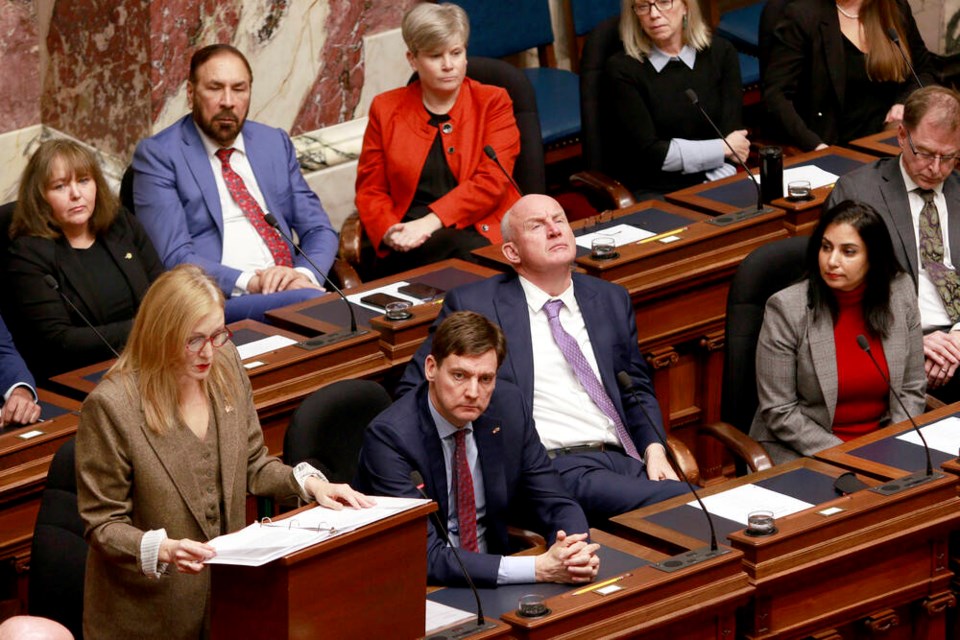Health
B.C. Government Faces Scrutiny Over Spending and Mismanagement

In a critical assessment, the Canadian Federation of Independent Business (CFIB) has condemned the British Columbia government for significant mismanagement of public funds. The CFIB’s report highlights a staggering budget deficit of $10.9 billion for the current fiscal year, marking a record high for the province. The organization also points to a troubling increase in public sector employment, which has surged by 210,000 since 2017, equating to a 55 percent rise, while private sector job growth has only reached 9.7 percent.
The report further asserts that public service labor costs have doubled during this period, with wage increases in the public sector outpacing inflation. Among the claims made, the CFIB argues that there is approximately one manager for every four workers in the health-care system. However, this assertion has been met with skepticism and a call for clarification regarding its accuracy.
Context of Public Sector Growth
While the CFIB’s findings raise valid concerns, particularly regarding the budget deficit, there are significant nuances in their data interpretation. The term “public sector” as defined by the CFIB encompasses not just government ministries but also educational institutions, such as schools and universities, which operate independently of provincial management. This broad classification complicates the narrative surrounding public sector growth.
In the health-care sector specifically, staffing numbers have nearly doubled, reflecting increasing demands for services. Patients experiencing prolonged wait times for specialist consultations and surgeries would likely advocate for additional resources in this area. The CFIB’s claim regarding managerial ratios also requires scrutiny; for instance, Island Health reports approximately 15,000 full-time-equivalent employees alongside around 650 managers. This translates to a ratio of one manager for every 23 employees, a stark contrast to the CFIB’s assertion.
Call for Financial Transparency
Despite the CFIB’s criticisms, the underlying issue of financial reporting in the province merits attention. The Ministry of Health operates with a budget close to $35 billion for the current year, yet the details provided in official estimates are insufficient. While the report specifies allocations of $24.7 billion for regional services, $8.1 billion for the Medical Services Plan, and $1.8 billion for PharmaCare, it lacks clarity on how these funds are distributed.
A recent incident involving the withdrawal of expensive drug treatment for a young girl suffering from Batten disease highlighted the need for greater transparency in health-care funding decisions. Following public outcry, the government reversed its decision, prompting Premier David Eby to advocate for improved transparency surrounding such critical choices. Expanding financial disclosure in budget documents would not only enhance public understanding of government operations but could also help mitigate inaccuracies and misrepresentations like those found in the CFIB’s report.
In conclusion, while the B.C. government faces legitimate scrutiny regarding its fiscal management, a comprehensive approach to transparency and accountability is essential. Addressing these financial reporting deficiencies will foster a better-informed public and contribute to more productive discussions on resource allocation in the health-care sector and beyond.
-

 Education3 months ago
Education3 months agoBrandon University’s Failed $5 Million Project Sparks Oversight Review
-

 Science4 months ago
Science4 months agoMicrosoft Confirms U.S. Law Overrules Canadian Data Sovereignty
-

 Lifestyle3 months ago
Lifestyle3 months agoWinnipeg Celebrates Culinary Creativity During Le Burger Week 2025
-

 Health4 months ago
Health4 months agoMontreal’s Groupe Marcelle Leads Canadian Cosmetic Industry Growth
-

 Science4 months ago
Science4 months agoTech Innovator Amandipp Singh Transforms Hiring for Disabled
-

 Technology3 months ago
Technology3 months agoDragon Ball: Sparking! Zero Launching on Switch and Switch 2 This November
-

 Education3 months ago
Education3 months agoRed River College Launches New Programs to Address Industry Needs
-

 Technology4 months ago
Technology4 months agoGoogle Pixel 10 Pro Fold Specs Unveiled Ahead of Launch
-

 Business3 months ago
Business3 months agoRocket Lab Reports Strong Q2 2025 Revenue Growth and Future Plans
-

 Technology2 months ago
Technology2 months agoDiscord Faces Serious Security Breach Affecting Millions
-

 Education3 months ago
Education3 months agoAlberta Teachers’ Strike: Potential Impacts on Students and Families
-

 Science3 months ago
Science3 months agoChina’s Wukong Spacesuit Sets New Standard for AI in Space
-

 Education3 months ago
Education3 months agoNew SĆIȺNEW̱ SṮEȽIṮḴEȽ Elementary Opens in Langford for 2025/2026 Year
-

 Technology4 months ago
Technology4 months agoWorld of Warcraft Players Buzz Over 19-Quest Bee Challenge
-

 Business4 months ago
Business4 months agoNew Estimates Reveal ChatGPT-5 Energy Use Could Soar
-

 Business3 months ago
Business3 months agoDawson City Residents Rally Around Buy Canadian Movement
-

 Technology2 months ago
Technology2 months agoHuawei MatePad 12X Redefines Tablet Experience for Professionals
-

 Business3 months ago
Business3 months agoBNA Brewing to Open New Bowling Alley in Downtown Penticton
-

 Technology4 months ago
Technology4 months agoFuture Entertainment Launches DDoD with Gameplay Trailer Showcase
-

 Technology4 months ago
Technology4 months agoGlobal Launch of Ragnarok M: Classic Set for September 3, 2025
-

 Technology4 months ago
Technology4 months agoInnovative 140W GaN Travel Adapter Combines Power and Convenience
-

 Science4 months ago
Science4 months agoXi Labs Innovates with New AI Operating System Set for 2025 Launch
-

 Top Stories2 months ago
Top Stories2 months agoBlue Jays Shift José Berríos to Bullpen Ahead of Playoffs
-

 Technology4 months ago
Technology4 months agoNew IDR01 Smart Ring Offers Advanced Sports Tracking for $169










